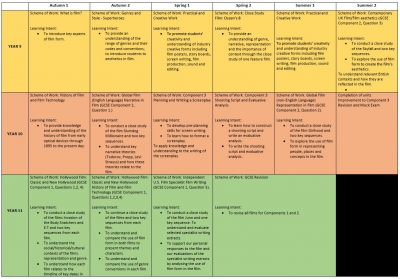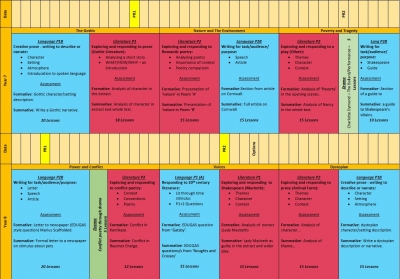English Learning Journey
Within the curriculum area of English at Wadebridge School, it is our goal to achieve a balance between developing the literacy skills needed to achieve examination results that will enable students to unlock the next stage of their learning, whilst fostering an enthusiasm for high quality literature that opens up the world of the past, present and future: this is underpinned by our desire to raise students’ cultural capital through the content, a range of trips and theatre visits.
Year 9 is a ‘transitional’ year in which we develop the skills needed for success in Language and Literature at KS4. Our schemes of work are written by our own experienced teachers, with a clear understanding of their 5 year learning journey. We integrate retrieval practice into our curriculum to ensure students have the best opportunity to recall and revisit each aspect of their learning when the time comes to undertake assessments.
Students are assessed through regular formative and summative assessment allowing students the opportunity to respond to areas that could be improved through in-class DIRT (dedicated improvement and reflection time) tasks.
English Curriculum Overview
The majority of students will complete their AQA English Literature and EDQUAS English Language GCSE at the end of Year 11 (selected students may be entered for EDUQAS Entry Level Certificate. Use the links below for more information:
GCSE English Language - course outline
GCSE English Literature - course outline
GCSE English Literature information
Film Studies Overview

The GCSE Film curriculum aims to inform students of the social, cultural and historical contexts which impact on creative choices within film.
It aims to inspire students to critically examine and form judgements, draw conclusions about the values and ideologies that are conveyed through a film’s cinematography and how contexts play a huge role in mediating these messages. Through a knowledge-rich curriculum, students will study the theoretical framework (film form) and will explore films from a range of cultures, including Hollywood productions and films from South Africa, Sweden and the UK. The study of set texts within these cultures will range from sci-fi to drama, horror and film employing hybrid approaches with subversions of audience expectation. Students will examine how people and ideas are represented and how the structural elements of film, including narrative and screen play, play a huge part in the messages presented. Students will also explore contemporary issues within society and culture, plus the shifts in attitudes, which have informed representations, including historical events which have influenced texts and their meanings today.

 Wadebridge School
Wadebridge School